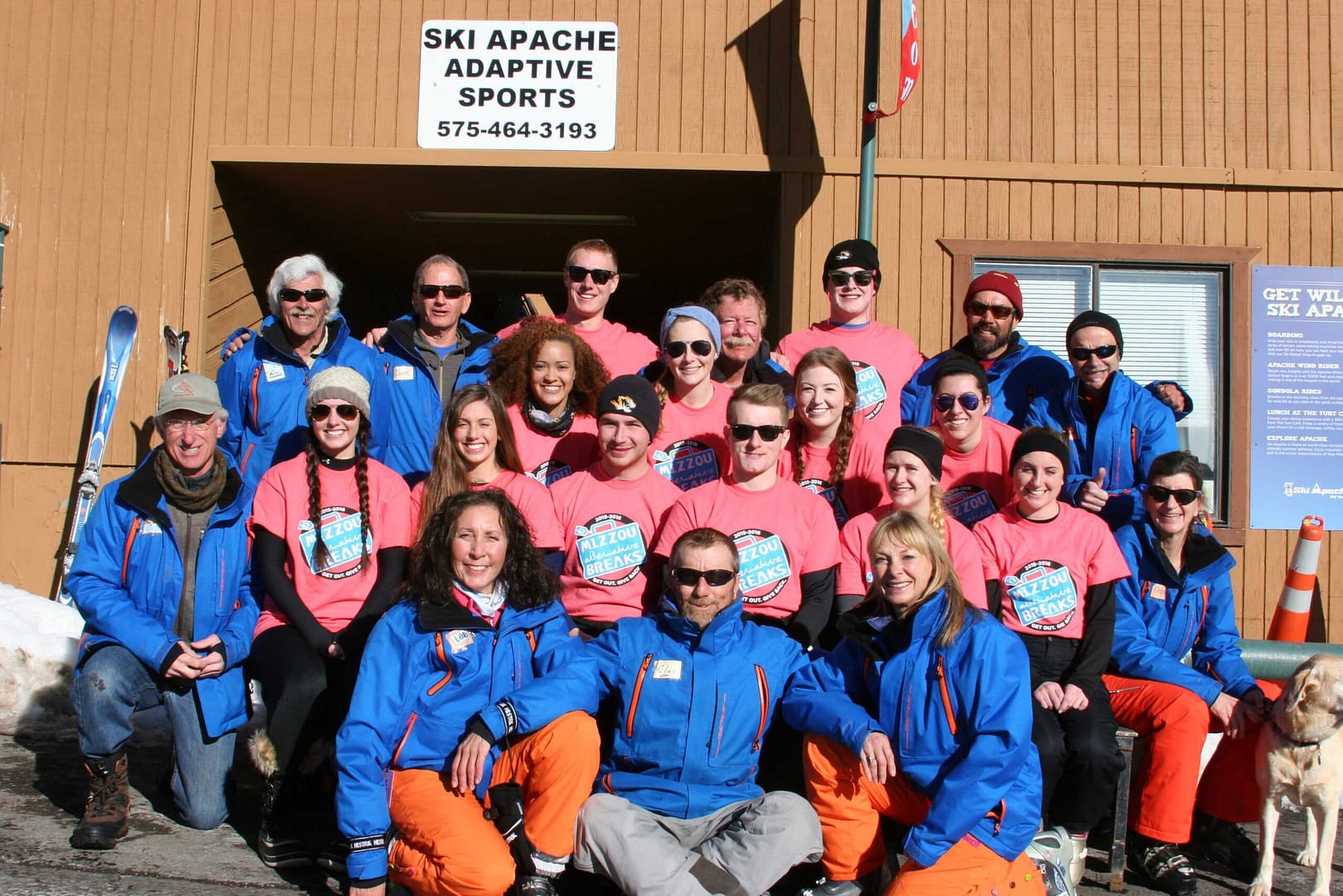University of Missouri Students Spend Break Volunteering

Twelve students from the University of Missouri chose to spend their winter break volunteering with Ski Apache Adaptive Sports (SAAS) as part of the university’s Mizzou Alternative Breaks (MAB) program. None of the students had been to New Mexico, none had ever tasted green chile and only two had ever skied before. Perhaps most surprisingly, none of the students knew each other before the trip. Some were interested in adaptive sports as a possible career choice, some knew people with disabilities, others had no frame of reference at all, however, all were immediately immersed and became intimately involved in teaching people with a wide range of disabilities to ski.
MAB is a student-run campus organization founded in 1991 that offers the opportunity to serve in areas focusing on disaster-relief, poverty, education, the environment, health, children and women, to name a few. The area of adaptive sports is relatively new and even newer as a winter trip.
“Winter breaks take place in mid-January so we are encouraged to go south to avoid bad weather,” said Kaylie Kierstead, one of the two trip organizers. “We were lucky to find New Mexico and SAAS.”
Trips are available over Thanksgiving, spring and winter breaks. Weekend programs are also being developed.
Kierstead and Austin Hein were randomly paired together to put the trip together.
“We spent the end of spring semester and summer finding sites, housing and looking at options,” Kierstead said. “We started reaching out to various adaptive sports programs across the country, including SAAS. They were extremely excited about our coming out.”
Kierstead and Hein contacted Shepherd of the Hills Lutheran Church in Ruidoso for a place to stay and brainstormed over what food to buy for meals.
“In the fall, we chose our participants,” said Kierstead.
Prospective volunteers are required to write a story about themselves and why they want to go on a trip. They then choose three areas: for the participants on this trip, adaptive sports was their first choice.
Students do not receive any extra- or college credit. The program is guided by seven principles; the primary one is “Serve, Don’t Help.” It is a reminder that volunteers are not to merely help people, but to serve them. It is believed that positive change takes place in the humble sharing and exchange of experiences.
The principle aptly describes the relationship among the university students, SAAS and students wishing to learn to ski.
“Working with these young people was truly inspiring, not only to me, but for all of our coaches,” said Shippen Salas, director of SAAS. “We put them to work right away, and it is hard work. It became apparent, though, that we weren’t just showing them what we do, we were planting seeds. This was an amazing group of compassionate, intelligent and committed people and to show the level of engagement at their age was amazing.”
The respect and admiration went both ways.
“I saw people living their lives to the fullest,” said Shelbey Parnell. “The stories of everyone here, including the coaches, were incredible. Their personal stories are the things that will keep me going, to keep striving.”
For most of the students, lessons learned through Ski Apache ended up building on their own narratives, often reinforcing their studies and personal experiences. For Parnell, a Black studies major with minors in gender studies, social justice with a multi-cultural studies certificate who was nursing a sore knee, the result of protesting at Ferguson, her temporary inability to get around a spread out and older, pre-ADA campus brought home lessons learned in the classroom about ableism, or discrimination against those with disabilities.
“I was studying issues of racism and sexism. I wasn’t familiar with ableism and, then, here I was,” confessed Parnell. “I learned in class that it is the only marginalized community that anyone can join at any time, and suddenly I was part of that community, forced to experience what that meant.”
It is an insight that coaches for SAAS know all too well, since so many students are not born with their disabilities. People who survive car, motorcycle and oil field accidents but who are now living without a limb or feeling in their legs are as likely to be a student at SAAS as those who have cerebral palsy, spina bifida or autism.
“Don’t limit yourself and don’t limit anyone else,” said Emily Schnitker, a human development and family studies major. “That is what I’ll take away from my experience here. Don’t take abilities for granted, and be there for each other, but, most importantly, keep the zest for life high.”
For volunteer coaches and staff of SAAS, most of whom are considerably older than the university students, that zest has become the basis for fond memories of monumental achievements from another time. Working with the university students who were obviously living outside of their comfort zones and seeing their enthusiasm and eagerness to embrace something new brought back those memories combined with the awareness of passing a torch.
Jackie Mattingly, who is majoring in electrical engineering with a minor in math, recounted her feelings on learning that a Mizzou alumnus had made a film of Alex D’Jamoos, a young man without legs climbing Mount Kilimanjaro on prosthetic legs.
“I climbed Kilimanjaro last year,” Mattingly said. “It was the most terrifying thing I’ve done. For someone to have the courage to do that…And then yesterday, I had a student who was both deaf and blind and was skiing. His only communication was by touch, but through his smile you could see his joy and happiness and excitement. There was no limitation on that, either. I want to be part of that—to encourage people to follow their dreams no matter what.”
“That is what this program is all about. MAB couldn’t embody it more,” echoed Salas.